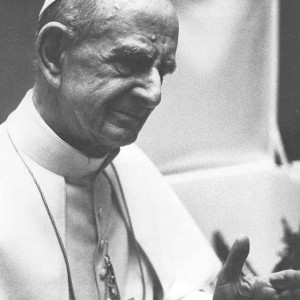 |
| Pope Paul VI (1977) |
Pope Paul VI gets a lot of grief from both conservative and liberal Catholics. His pontificate, which lasted from 1963 to 1978, was at a particularly tumultuous time in the Church and the world. But whatever else may be said of Pope Paul, his encyclical on contraception, Humanae Vitae, seems downright prophetic.
The encyclical is from 1968, the sixth year of his pontificate. Vatican II had concluded in 1965, and already, there were all sorts of innovations (both the pious and the bizarre) being defended as being in “the spirit of Vatican II.” The doors seemed open to Modernity, for the Church to become compatible with the world. And it’s here, at this point in history, that Catholics began really openly questioning the Church’s ban on contraception. It seemed so hopelessly archaic: what’s the moral danger of contraception, after all?
Pope Paul took his time deliberating on this question, but when an answer finally came down from the chair of Peter, it was a thing of beauty. The entire encyclical is worth a read, but we get the clearest glimpse of the Holy Spirit’s behind-the-scenes work in paragraph 17, in which Paul predicts the “consequences of artificial methods”:
Carlo Saraceni, Gregory the Great (1610) Responsible men can become more deeply convinced of the truth of the doctrine laid down by the Church on this issue if they reflect on the consequences of methods and plans for artificial birth control. Let them first consider how easily this course of action could open wide the way for marital infidelity and a general lowering of moral standards. Not much experience is needed to be fully aware of human weakness and to understand that human beings—and especially the young, who are so exposed to temptation—need incentives to keep the moral law, and it is an evil thing to make it easy for them to break that law. Another effect that gives cause for alarm is that a man who grows accustomed to the use of contraceptive methods may forget the reverence due to a woman, and, disregarding her physical and emotional equilibrium, reduce her to being a mere instrument for the satisfaction of his own desires, no longer considering her as his partner whom he should surround with care and affection.
Finally, careful consideration should be given to the danger of this power passing into the hands of those public authorities who care little for the precepts of the moral law. Who will blame a government which in its attempt to resolve the problems affecting an entire country resorts to the same measures as are regarded as lawful by married people in the solution of a particular family difficulty? Who will prevent public authorities from favoring those contraceptive methods which they consider more effective? Should they regard this as necessary, they may even impose their use on everyone. It could well happen, therefore, that when people, either individually or in family or social life, experience the inherent difficulties of the divine law and are determined to avoid them, they may give into the hands of public authorities the power to intervene in the most personal and intimate responsibility of husband and wife.
In other words, Paul was able to see everything from the loosening of societal morals and the increase in infidelity, to the “pornification” of culture (and objectification of women), to the risk of state–imposed contraception (including sterilization). And he saw all of these things in 1968, when perilously few others were sounding the alarm.
A few years ago, on the fortieth anniversary of Humanae Vitae, the Hoover Institute’s Mary Eberstadt wrote a piece for First Things demonstrating how each of the four predictions (which Eberstadt summarizes as “a general lowering of moral standards throughout society; a rise in infidelity; a lessening of respect for women by men; and the coercive use of reproductive technologies by governments”) had come true. In that piece, she notes an odd irony, that Humanae Vitae has been vindicated by the empirical data produced by secular social scientists:
Although it is largely Catholic thinkers who have connected the latest empirical evidence to the defense of Humanae Vitae’s predictions, during those same forty years most of the experts actually producing the empirical evidence have been social scientists operating in the secular realm. As sociologist W. Bradford Wilcox emphasized in a 2005 essay: “The leading scholars who have tackled these topics are not Christians, and most of them are not political or social conservatives. They are, rather, honest social scientists willing to follow the data wherever it may lead.”
Whatever else may be said for or against Paul VI’s pontificate, he tackled a thorny and unpopular moral issue in a pastoral way, and in a way that appears prophetic in hindsight. He saw, when so few could see it, how dangerous contraception was. The tragic irony is that even now, as we suffer from the social ills it helped herald, we’re largely too blind to make the connection.



No, but if the faithful can’t agree on the matter, then the Council is the only option no?
No, it’s not the only option. All Orthodox Christians accept the same authoritative sources containing the Church’s teaching. If one “side” chooses to ignore these sources, they cannot be presumed to be on equal footing with the other “side” so as to necessitate an arbiter. It’s as if Curran demanded arbitration between himself and the followers of Humanae Vitae. It might come to that, but it’s not the only option.
I’m kinda new to being a Catholic, and perhaps Joe can bail me out, but I thought Catholics believed that encyclicals had the same force on the Faithful as an Ecumenical Council?
Danial, Welcome to the Church. Joe is a master an answering clearly and well, but I’ll put this out there.
Short answer, it am pretty sure is no. An encyclical is a letter of guidance and it’s hard to make a general statement about what level or degree of consent it requires, but ordinarily, in and of itself the encyclical does not have the weight of the council.
However, to the extent the encyclical restates and affirms articles of faith that have been dogmatically proclaimed by the councils those elements do require the same level of consent.
There may be other statements or passages in an encyclical that affirm and elucidate teaching of the *ordinary Magisterium,* meaning articles of faith that have been taught continuously by the Church but never specifically been dogmatically defined by a Council or Papal Decree.
Other parts, and most of a typical encyclical is practical application and exposition on some aspect of the faith and requires are respectful acceptance but not necessarily our consent or agreement. It is a fine distinction. Perhaps Joe will correct me a bit, but the difference is something like these elements are not binding on my conscience but still as the guidance from the Pope I must respectfully consider them and listen.
Some elements of an encyclical might fall into the category of “prudential judgement” meaning that we only have to consider the Pontiff’s thoughts but these statement do not carry the authority of the office of Pope.
There is a classic often cited book by Ludwig Ott called “Fundamentals of Catholic Dogma” which goes through a somewhat traditional 7 tier system of what degree of authority are carried by certain types of statements and the appropriate degree on consens corresponding to each. Although I’ve often heard there are some issues with the English translation.
The most authoritative statement that forbids the barrier method is what?
Daniel, Humanae Vitae and contraception are excellent topics for this kind of discussion.
To start off, I think asking “What is the most authoritative statement” is not the most Catholic approach to a question. Rather, I think looking at the whole body of teaching with as much of an open mind as we can muster being willing to listen to the voice of the Church and then trying to understand and digest and internalize that teaching. I am not saying there can’t be some arguing along the way, but I think starting off with a very modern and frankly somewhat Protestant perspective that every question requires that there be a very specific and clear statement is not helpful or Catholic.
Regarding the Church’s entire teaching on sexual relations, most of it is the teaching of the Ordinary Magisterium. It is simply what has been taught consistently, always and everywhere within the Church. There has never been (prior to our time) any need to Dogmatically define a doctrine because within the Magisterium (among the Bishops) there has never been any real disagreement or objection.
The Church has always taught marriage is between 1 man and 1 woman, that sex before marriage is sinful, that there is no remarriage after divorce, etc.. and also that only men can be ordained to Holy Orders. Virtually none of that is formally dogmatized.
St. Thomas Aquinas in the Summa I think Book 2, sections 70-85 or so hits the topic of sex and contraception. No it isn’t authoritative in and of itself but it his a highly respected source that generally summarizes the ordinary teaching of the Church and understanding Thomistic theology in this area is important for reading any of the encyclicals related to the subject. Casti Cannubi by Pius X1 is the first modern encyclical on marriage and family. Then Humanae Vitae
I would point out that even in the dispute about humanae vitae there was NEVER any question about whether “barrier methods” were acceptable. The only question then and now is whether chemical methods that didn’t place a barrier between the couples were subject to the same condemnations as barrier method.
Daniel, 1 more message. First here is a link to The Summa Theoligica sections that most direct pertain.
About a year ago when the dust up regarding BXVI’s comments in an interview regarding condoms was totally mis-interpreted by the media and got the blogs going we had a big discussion at Called To Communion the comments on this article run to #170 something. But starting at about comment 80 or so a debate went on between Nathan, Johannes and Myself with input from Ray and a couple of others. The last 30 comments or so on the topic are mainly the conclusion of this argument. Here are links to two of my comments that I think might be relevant depending on why you are asking.
http://www.calledtocommunion.com/2010/11/did-the-pope-condone-condoms-in-certain-cases/#comment-13786
http://www.calledtocommunion.com/2010/11/did-the-pope-condone-condoms-in-certain-cases/#comment-13614
The Summa has been wrong before, and I just don’t understand the rationale that would deny the barrior method to space children as a sin, but not NFP.
The authority of the Church saying it is a sin would be enough, but it sounds like the Church hasn’t authoritatively said that yet?
“The teaching of the Church regarding the proper regulation of birth is a promulgation of the law of God Himself.”- Vitae 20.
Pope Paul actually answers the question you raise in HV 14-16, concluding the thought in this way:
“Neither the Church nor her doctrine is inconsistent when she considers it lawful for married people to take advantage of the infertile period but condemns as always unlawful the use of means which directly prevent conception, even when the reasons given for the later practice may appear to be upright and serious. In reality, these two cases are completely different. In the former the married couple rightly use a faculty provided them by nature. In the later they obstruct the natural development of the generative process. It cannot be denied that in each case the married couple, for acceptable reasons, are both perfectly clear in their intention to avoid children and wish to make sure that none will result. But it is equally true that it is exclusively in the former case that husband and wife are ready to abstain from intercourse during the fertile period as often as for reasonable motives the birth of another child is not desirable. And when the infertile period recurs, they use their married intimacy to express their mutual love and safeguard their fidelity toward one another. In doing this they certainly give proof of a true and authentic love.”
This is certainly a part of the Magisterial teaching of the Church, even though it isn’t defined ex cathedra in the way certain dogmatic definitions have.
I.X.,
That reads to me like the issue hinges on naturalness. Are thermometers natural? Or the act of measuring cervical mucus?
Daniel, It isn’t easy to think with the Church. Probably you aren’t going to make peace with this in one day. Like I mentioned above, it helps to start with the whole perspective – a very broad perspective – of the Catholic theology of Humanity, sex, love and marriage. Trying to attack just one targeted issue in isolation either leads repeating the same statements and not increasing anyone’s understanding, or a rapidly expanding pandoras box of further contentious questions.
I have a couple links where I have addressed this on my own aborted blog attempt but I’ll briefly overview here and again, take the long game approach on this – don’t expect to understand today – think maybe about reading and studying and praying over this area for a year or so.
Overview – Genesis Chapter 1, God created man Male and Female. The whole sex thing is right at the beginning of the Bible and is central to God’s relationship with man. Sex as in male and female and sex as in intercourse are God’s great (possibly greatest) gift to humanity. For Jews and Christians sex is not some side issue and NOTHING about sex is trivial.
The sexual act is also our greatest participation in God’s creation because we can actually participate with God in the creation of another person.
So while we materialist, deconstructionist, scientific moderns think a piece of rubber doesn’t make any difference we are thinking within a frame of reference and a philosophy that is very removed from a religious understanding of sex.
From Genesis we know that sex is unitive – it unites the couple in marriage and it is reproductive and that those two aspects are both part of the same Gift from God as part of his act of creation. There is this word “Fecund” that I won’t go into know, but in thinking theologically about sex I’ve come to believe it and “fruitful” have deep theological meaning.
Anyway, following this through the Church has always and everywhere taught, and really I think the Jews taught as well, that sex is only for marriage and each and every act must respect both the unitive and reproductive.
Then as Joe mentioned above, the difference between NFP and condoms. In NFP one is choosing for serious reasons to abstain from using the sexual gift – which is perfectly licit in the sense that there is no sin inherrent in not having sex on a given day. Where contraception is choosing to use God’s gift but deliberately manipulate it and twist it to suit our own desires.
Gotta run, I should take more time with this but will post it anyway and come back later.
Barrier methods result in more physical unity than continence, no? And gaming a monthly cycle doesn’t promote creation?
Barrier methods result in more physical unity than continence, no?
Apples to oranges: continence isn’t sex. The barrier method is sex, but is a perversion of sex.
The Catholic Church teaches that sex is inherently ordered to be unitive and procreative. Pointing out that continence (an absence of sex) isn’t unitive and procreative doesn’t disprove that.
Sad to say, the paper was the final assignment and I never got feedback. The instructor admitted that he is still “on the fence” about abortion and life issues, including contraception (he is a philosophy professor). To his credit, however, I would categorize him as a genuine “seeker” who is open to other viewpoints. As to those things he’s convinced of, however, well … not so much. Not unlike the rest of us, I guess!
Joe, succinct and convincing.
How do we know if barrier methods are venial or mortal sins?
Paul in the GNW: You provide excellent catechesis. I hope you are using your gift regularly to help people come into the Church. Good work.
Daniel, keep digging. You will eventually reach an ocean of truth, goodness, and beauty.